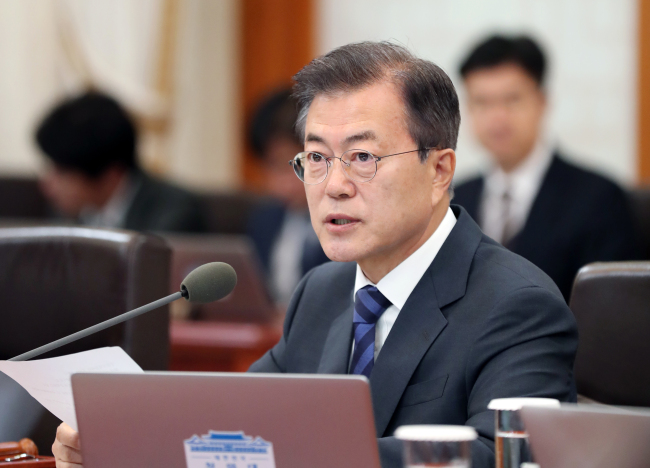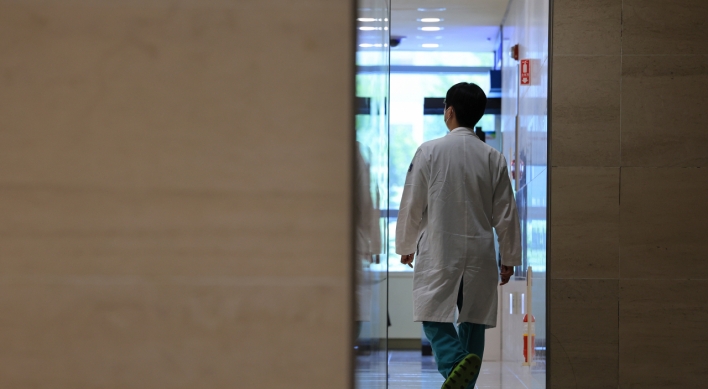In first year, Moon brings meaningful but limited changes to national politics
By YonhapPublished : May 9, 2018 - 09:40
In his first year in office, President Moon Jae-in sought to spur meaningful changes in a wide range of areas, including the way a president interacts with the people, but his efforts to create change in local politics may have been limited partly due to strong resistance from opposition parties, and also by seemingly more urgent international issues, such as North Korea's evolving nuclear capabilities.
It was exactly one year ago Thursday when Moon took the top executive office, becoming the country's first liberal president in nearly a decade.
What led to his early election in May, instead of December, when presidential elections are typically held, was the ouster of former President Park Geun-hye over corruption allegations.
It was exactly one year ago Thursday when Moon took the top executive office, becoming the country's first liberal president in nearly a decade.
What led to his early election in May, instead of December, when presidential elections are typically held, was the ouster of former President Park Geun-hye over corruption allegations.

Many also believe Moon's election was made possible by the public backlash against the corruption scandal involving conservative circles.
And perhaps that was why the new president sought to change the government, national politics and even the Constitution, in just about every way and every area possible.
"Right now, my heart is burning with passion to build a nation that no one has ever seen. And my head is full of blueprints for a new world of integration and co-existence," Moon said in his inaugural speech.
"The people have asked 'is this a country?' President Moon Jae-in will begin with addressing that very question. From this very day, I will become a president to build a nation that deserves to be called a nation. I will resolutely part with ill practices of the past. Changes will start with the president," he had said.
His efforts to bring about changes could be witnessed in his maiden trip to the presidential office Cheong Wa Dae when he stepped out of his heavily-guarded vehicle to greet and shake hands with a group of people waiting outside of his new residence, a sensational gesture that could rarely be seen from what Moon has called his authoritarian predecessors.
Changes sought by the Moon administration have been wide and far-reaching.
The government has proposed 100 policy objectives in five major areas, including politics and international relations, which are then broken down into 481 action plans detailed in a 197-page report published two months after Moon's inauguration.
On the domestic front, the proposed changes were spearheaded by a move to amend the Constitution for the first time in over three decades.
The proposed changes sought to lessen the power of the president, instead of strengthening it.
However, the move to revise the Constitution remains frustrated amid a boycott by the main opposition Liberty Korea Party.
The LKP holds 116 seats in the 300-seat unicameral parliament, just five seats short of 121 held by the ruling Democratic Party.
The main opposition party has been sitting out of the ongoing extraordinary session of the National Assembly, blocking both the parliamentary session and a vote on a government-proposed bill on the constitutional amendment.
Moon has vowed to still realize some of the changes proposed under the constitutional revision bill by revising related laws and government regulations.
It could have been the sheer number of Moon's pledges that landed him a B on his first-year report card from a major civic organization, People's Solidarity for Participatory Democracy, though Moon's grade is still two notches higher than the C Plus his ousted predecessor Park received from the same organization in her last year in office.
The civic organization noted the new president has fully implemented less than 13 percent of his election pledges so far, less than half of the 28 percent for Park in her first year.
Still, the people apparently believe Moon is trying to live up to his promises.
Moon's approval rating has mostly remained in the 70 percent range throughout his first year in office while the latest poll conducted by Gallup Korea last week showed Moon's approval rating at 83 percent.
The latest reading marked a 10 percentage point spike from a week earlier, mostly caused by his historic summit with North Korean leader Kim Jong-un, held on April 27, but it still marked the highest for all South Korean presidents in history after their first year in office, according to the local pollster.
Moon still may have failed in areas where others have succeeded, such as finding the best person for a given job.
So far, six of Moon's nominees for vice ministerial or higher posts have been forced to resign before or after their appointment, Cheong Wa Dae noted, largely due to suspicions of corruption or other past wrongdoings.
The number is a small portion of 254 ranking government officials appointed since Moon's inauguration, according to Cheong Wa Dae, but a large enough number to invite serious attacks from the already-critical opposition parties.
Moon has vowed to more actively communicate with the people and the opposition parties so that his administration and policy initiatives will not become self-righteous or aloof from the people's expectations.
From the onset, he has also called the opposition parties key partners in managing state affairs, often offering his personal insight on various issues directly to the leaders of both ruling and opposition parties.
His willingness to communicate has often been the number one reason for the people's support or approval of his state management in local surveys as it apparently makes him a president, unlike any other presidents before, who may actually listen to what people have to say, which perhaps could have been another change Moon sought to deliver in the first place.(Yonhap)









![[Kim Seong-kon] Democracy and the future of South Korea](http://res.heraldm.com/phpwas/restmb_idxmake.php?idx=644&simg=/content/image/2024/04/16/20240416050802_0.jpg&u=)










![[Today’s K-pop] Zico drops snippet of collaboration with Jennie](http://res.heraldm.com/phpwas/restmb_idxmake.php?idx=642&simg=/content/image/2024/04/18/20240418050702_0.jpg&u=)